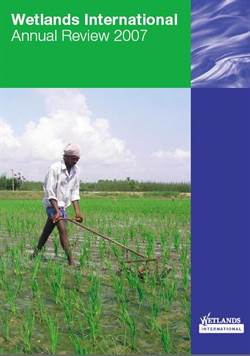
Annual Review 2007
Our Annual Review 2007 covers our global organisation and presents the financial information, all our projects, publications and achievements. Wetlands International clearly demonstrated in 2007 the important role it can play as a science-based organisation that can act as a global witness – bringing key facts from the field to the attention of policy-makers. A good example of this was our role in highlighting and quantifying the role of wetlands and especially peatlands as the worlds’ biggest natural terrestrial carbon stores – and demonstrating that through restoration of damaged wetlands we can cost-effectively reduce emissions of carbon dioxide (CO2) and even halt and reverse them, through carbon sequestration. Equally our role in a number of global and regional projects addressing the avian influenza threat has been to provide data on waterbirds and wetlands so as to contribute to the understanding of how the disease spreads, analyse risks and help countries to make preparations for an outbreak.
During 2007, the Wetlands International network started to document its research and field experiences that have highest relevance to climate adaptation strategies, focusing on vulnerable coasts, the Sahelian zone and high mountain wetlands. This information is used to urge governments, development organisations and finance institutions to integrate wetlands conservation and restoration into climate change and development strategies. The role of Wetlands International in demonstrating practical solutions to wetland degradation is proving valuable in all regions of the world.
Our major field programmes – for example in Green Coast, Wings over Wetlands (WoW, Wetlands and Poverty Reduction Project (WPRP), Central Kalimantan Peatland Project (CKPP) – have been monitored and evaluated by external parties over the last year. The reviews have provided the opportunity for valuable institutional reflection and learning. It is noteworthy that they all highlighted the value of our science-base and our partnerships as well as the tangible evidence of benefits to nature and livelihoods that have resulted from our community-based projects. Commentators have also emphasised the relevance and potential of our innovative approaches to analysing, financing and facilitating community action to the globally-connected challenges of poverty reduction and climate change adaptation. Clearly, we have more work to do!
At our well-attended Members Meeting held in Shaoxing, China in November 2007 we celebrated the formal adoption of the statutes of the Association of Members, the establishment of the Board of the Association as well as the appointment of our new Chair and President and a number of new Supervisory Council members. It is my pleasure to work for and with these inspiring and knowledgeable people. This Meeting also provided an excellent opportunity to evaluate our overall progress against our Strategy goals and targets and to refresh the regional perspectives on future programmatic and institutional priorities. Together with our Chinese hosts, we staged an international Symposium on the theme of “Healthy wetlands, Healthy people”; the outputs of which have helped to shape Ramsar Convention thinking and development of draft Resolutions for COP10 in 2008.
As noted by our members and partners during our Members Meeting and in the following pages, the turnover, reach and impact of Wetlands International has grown at a faster pace than was anticipated in 2004 when our new Strategy was launched. However, the Strategy has served to focus our activities and growth has not resulted from a broadening of scope. Instead, it mostly reflects the scaling up and extension of our flagship projects in the regions and our increasing attention on converting our experience and knowledge into policy influence. This growth has been accompanied and assisted by greater visibility in the media and some exciting new partnerships – including with the development sector, industry groups and many other international and national CBOs and NGOs. Mindful of the challenges and risks from fast growth, we have increased our attention and investment on strengthening our organisational capacity, systems and processes – and this will necessarily be a continuing focus during the coming years. A key component of this will be improving our communications, coordination and collaboration with our specialist expert network, members, partners and donors.
The annual review is made with the assistance of all our offices world wide.

